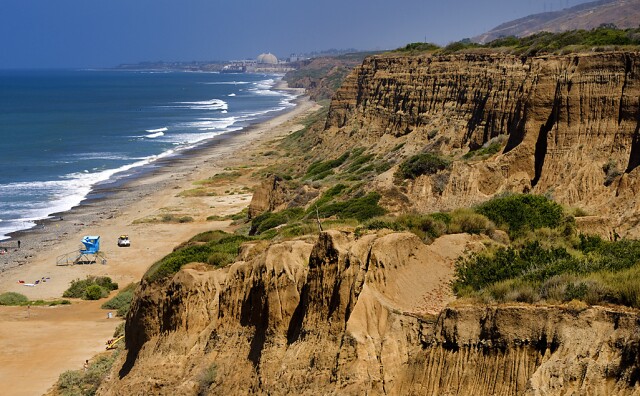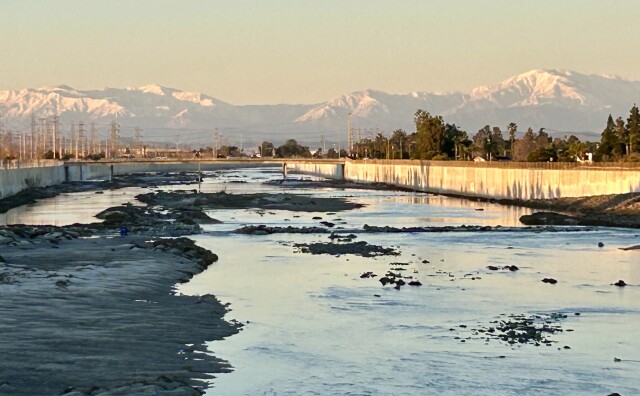There’s A Lot Of Money Available To Switch To A Heat Pump Water Heater. Here's Why Making The Switch Matters

All-electric everything is the way of the future as cities across the Southland — and the world — work to get off gas and coal power to lower planet-heating emissions and local air pollution by supplying electricity via cleaner options such as solar and wind.
And buildings are where we use a lot of that dirty power. In L.A., largely the use of gas and electricity in buildings makes them account for more than 40% of the city’s greenhouse gas emissions. As we transition to a cleaner supply of electricity and electrify homes at the same time, those emissions will go down.
There’s a lot of money from the local to state to federal level to help folks begin the electric transition at home. One place to start? That old water heater.
Heating water is typically the second-largest source of energy use in a home, behind heating and cooling air. Electric heat pump water heaters are three to four times more efficient than gas ones, which can help with your bill, depending on how you use it. (Heat pump air conditioning and heating is also more efficient — more on that here.)
Heat pump water heaters as batteries
But not only does this technology use less energy to do more — these types of water heaters can actually serve as energy “batteries” as well. That means they can be programmed to heat water during the middle of the day when there’s an oversupply of solar power and electricity rates are the cheapest.

Then they can store that heated water until later when you hop in the shower in the evening when electricity rates and demand are highest, and when solar power is waning (because we don’t yet have enough grid-scale battery storage).

This makes the heat pump water heater one of the most cost-efficient and simplest ways to help address the challenges we have of high electricity demand and higher risk for rolling power outages during increasingly hot summer evenings and nights.
“For the most part, you're using your water heater very consistently throughout the year, as opposed to an air conditioner or a furnace, which has a very seasonal usage,” said Friday Apaliski, a spokesperson for the Building Decarbonization Coalition, a nonprofit that works to get fossil fuels out of buildings and is a partner with the state in getting the word out about these financial incentives via switchison.org. “And so when we think about really getting efficient in our homes and our energy systems and doing right by the climate, the water heater is a really key piece of that.”
Money available to install more heat pump water heaters
Programming a heat pump water heater to use the most electricity during the times of day when power demand is lower and cheaper is a requirement of a state-funded program, called TECH Clean California, that provides some of the largest available financial incentives for swapping out that gas water heater for an electric heat pump.
The vast majority of available funding is currently for low-income households and renters. Whether you qualify depends on where you live — for example, a family of four in L.A. County qualifies if they make $100,900 a year or less.
-
You can learn more about the available incentives for heat pump water heaters and financial incentives for other electric and energy-efficient appliances at switchison.org, which is available in multiple languages.
- Heat pump water heater information.
- Learn more about low-income incentives here.
- Whether you qualify for low-income incentives depends on where you live. You can search whether you qualify here.
- Search for a TECH-certified contractor here (the map may take a minute to load).
The program was so popular it quickly ran out of funding in its first year and is once again almost out of funding for households that don’t qualify as low-income. But there’s still a lot of money available for low-income households — at least 40% of the funding is required to benefit low-income communities that have outsized pollution burdens.
-
Southern California Edison has a program that fully covers the cost of a lot of electrification for qualifying households.
And these aren’t rebates — the incentive is completed through the contractor, who has to be certified by TECH. That allows the customer to receive the financial benefit immediately, and the onus is on the contractor to complete the necessary paperwork.
-
The money for these incentives comes in part from the rates we pay for gas as well as general taxes. Learn more here.
For those households, the funding covers up to $4,185 for the new heat pump water heater and another $4,000 for any electrical upgrades in the house that may need to happen to support the new water heater.
A contractor’s perspective
One of the biggest barriers to more low-income households participating in these programs is that people simply don’t know they exist, said Josué Zepeda, a program manager with Paramount-based HVAC company Reliable Energy. The company primarily does installations for low-income houses and apartments across L.A. and Orange counties via TECH and Southern California Edison incentive programs.
-
At magnitude 7.2, buildings collapsed
-
Now spinning in front of Santa Monica apartments
-
Advocates seek end to new LAUSD location policy
“[Many of our customers] have yet to understand words such as heat pump or electrification,” said Zepeda. “They do hear on the news when it comes to vehicles. They do hear on the news when it comes to greenhouse gas emissions and helping the climate crisis in regards to California and overall the world. But when it comes to a personalized view to their homes, they're like, ‘Well, as far as I know, I have been told to set my thermostat at certain temperatures, or I've been told to do certain changes in my lifestyle, but I have yet to hear of changing my water heater out.'”
Heat pump water heaters and other more efficient electric appliances and air conditioning systems can also save you money, but it may not always be the case in reality, said Ron Garcia, who owns the company.

“We've had customers say ‘Well, before I used to go to a cool center throughout the day and stay there and now I stay in my home because it's more comfortable,’ so therefore they feel that 'Oh, I'm saving money, I can run it longer,’” Garcia said. “Well, when you’re running it longer, you're going to end up having to pay more in your bill. The costs on an annual basis to run a gas water heater versus a heat pump water heater are almost identical, but let’s see it in reality.”
He said there’s also the simple fact that electricity rates are going up, which the state is currently grappling to address.
Garcia emphasized these nuances are why a more holistic approach to education about electrification is needed: it’s not just about swapping out one appliance for another to save money — it’s about how energy is used and wasted in your specific home. But starting with an appliance often leads to the question — what’s next? For example, Garcia said, everything from weatherizing the home so it’s not wasting energy on leakage to getting solar panels and battery storage, where major bill savings can occur.
“It’s a step. Now we're telling them, go get solar because now you really need it,” Garcia said. “Now you'll truly get savings.”
Contractors themselves also need more education, said Zepeda. Often, contractors don’t know of the options or aren’t trained to install such appliances.
“My job as a contractor is I need to go and fix the situation,” Zepeda said. “Instead of saying, with what is coming with California's policies, well, maybe a heat pump water heater or a heat pump furnace would make sense for this home. So, it all circles back, whether it's for the public, whether it's for contractors, it's a big educational push.”
Resources
-
- Visit switchison.org to learn more and search incentives.
- Find electrification incentives available to you based on your zip code (and a reminder given it’s almost tax day – if you got a new electric appliance this year, you likely qualify for a tax credit via the Inflation Reduction Act): Search for incentives here.
- Find a contractor and search by type of appliance you’d like to replace here (it may take a minute to load).
- Read our guide on rebates and other electrification incentives available from the local to state to federal level.
- Read our guide on swapping out your old air conditioner for a more efficient heat pump.
- Read more about how low-income households can access free solar panels.
-
Can The Power Grid Keep Up With Worsening Heat And Fewer Fossil Fuels
- What does electrification mean for our utility bills?
-
The state's parks department is working with stakeholders, including the military, to rebuild the San Onofre road, but no timeline has been given.
-
Built in 1951, the glass-walled chapel is one of L.A.’s few national historic landmarks. This isn’t the first time it has been damaged by landslides.
-
The climate crisis is destabilizing cliffs and making landslides more likely, an expert says.
-
Lifei Huang, 22, went missing near Mt. Baldy on Feb. 4 as the first of two atmospheric rivers was bearing down on the region.
-
Since 2021, volunteers have been planting Joshua tree seedlings in the Mojave Desert burn scar. The next session is slated for later this Spring, according to the National Park Service. Just like previous times, a few camels will be tagging along.
-
There are three main meteorological reasons why L.A. is so smoggy — all of which are affected when a rainstorm passes through and brings clearer skies.






